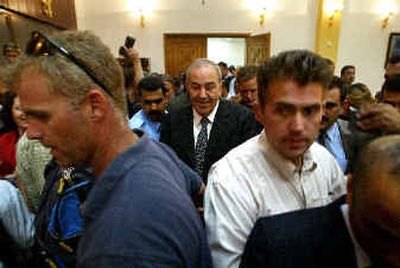Top Iraqi minister faces tough task

BAGHDAD, Iraq – Iyad Allawi, the prime minister who took power in Iraq on Monday, is dismissed by militant Shiites and Sunnis as a puppet of the Americans. To many Iraqis, he is an out-of-touch “outsider” who has no popular base.
One thing is certain though: the CIA-linked opposition leader-turned-politician seems determined to do everything he can to restore security, including use of some tactics that hark back to Saddam Hussein’s days.
The challenge facing Allawi, 58, is twofold: to win the acceptance and cooperation of a mostly skeptical population and to deal with a ruthless and increasingly sophisticated insurgency.
“This government will act randomly like the Governing Council before it,” said Khaled Mohammed, a 42-year-old taxi driver.
“It is appointed by the occupier, who does not want anything good to come to our people,” he said, speaking from a long line outside a gas station.
“This is a temporary and illegal government,” said Shiite cleric Moussa al-Nagi. “Yes, Iyad Allawi is a Shiite, but he is not an Islamist, and his thoughts and aspirations have nothing to do with Shiites or Sunnis.”
Such sentiments are not uncommon in a nation where many blame the Americans for their daily hardships, the precarious security of the past year and what they see to be the imposition of politicians like Allawi, who was in exile for 30 years before returning to Baghdad last year.
Even after his return, he has spent much of the past year traveling abroad — so Iraqis have had little chance to get to know the one-time exile opposition leader.
Allawi has been projecting an image of strength and resolve in his public appearances since being named to his post at the beginning of June.
Allawi has said his government will pass new laws giving security forces a stronger hand in arrests and allowing them to impose curfews.
He is also planning to recall to active service units of the disbanded Iraqi army to help with the fight against the insurgents.
Such a move could have benefits on two fronts: acquiring the service of seasoned soldiers and depriving insurgents of their expertise. Many army officers – disenfranchised and embittered by their post-Saddam unemployment – are known have been advising insurgents in combat tactics.
Saddam’s 400,000-strong army was disbanded in May last year by L. Paul Bremer, the American governor of Iraq who handed power to Allawi on Monday. Allawi says he opposed the disbanding, which is widely thought to have prompted noncommissioned and junior officers to join the guerrillas.
Allawi also made other overtures to the army on Monday. He said he would “restore the dignity” of the army, retrain soldiers for civilian jobs or offer them “retirement with dignity and honor.”
Allawi coupled his gesture to the army with a strongly worded appeal to former members of Saddam’s Baath party, also disbanded by Bremer last year, not to cooperate with Saddam loyalists and to inform authorities of their activities.